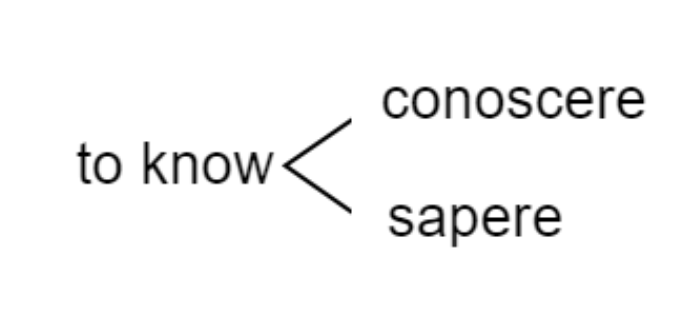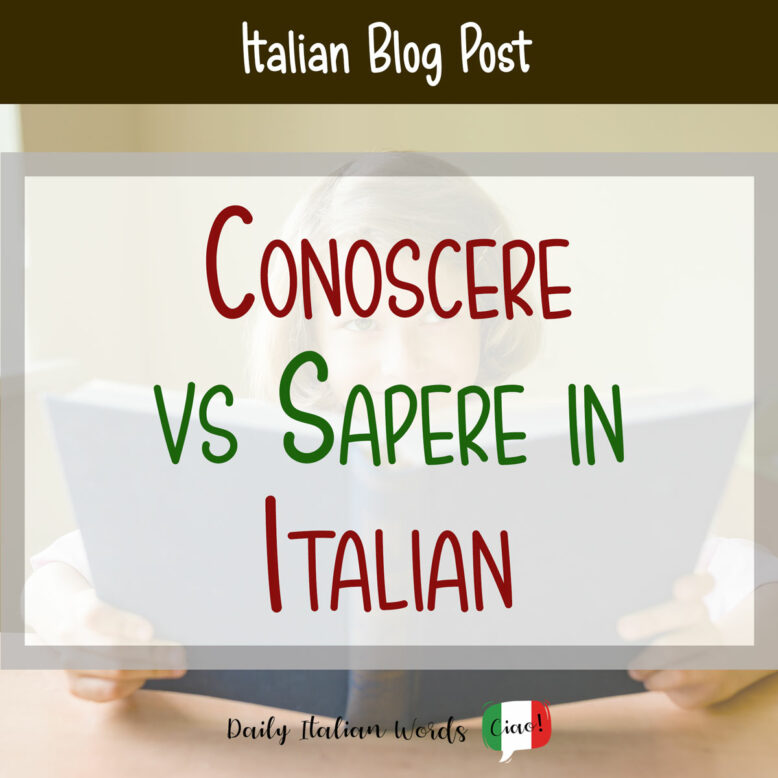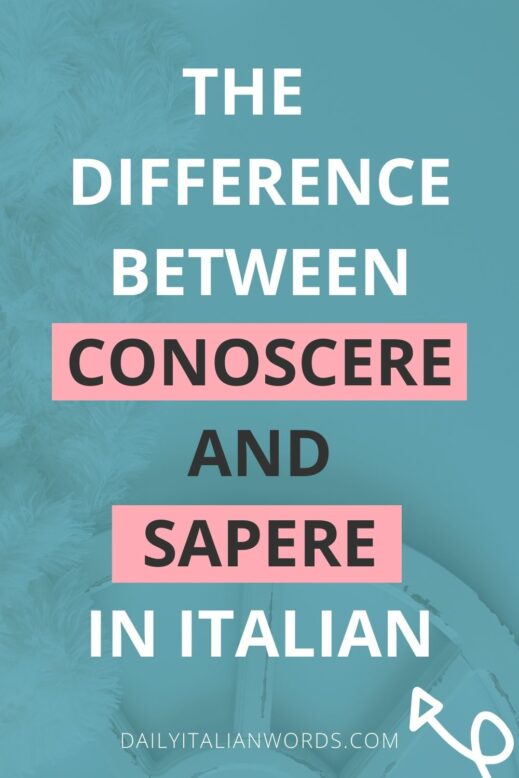One of the most insidious obstacles on the way to speaking correct Italian is distinguishing the different uses of the verbs conoscere and sapere which both translate as “to know”. The problem, in its simplest representation, is the following:

In this article, we will first examine these two verbs separately, then we will look in detail at the situations in which conoscere and sapere can be used, alternatively, in the same sentences.

1. CONOSCERE
Introduction
Conoscere comes directly from the Latin cognoscĕre, the root of which is also present in English words such as cognition, cognitive and to recognize.
Conoscere is a regular verb. This means that in order to conjugate it, you just need to replace the ending -ere with the corresponding ending for each person of the verbal tense taken into consideration.
Let’s see the Presente Indicativo / Present Simple as an example:
- Io conosco
- Tu conosci
- Lei / Lui conosce
- Noi conosciamo
- Voi conoscete
- Loro conoscono
In compound tenses, conoscere takes the auxiliary avere / to have:
Io ho conosciuto Mario all’università.
I met Mario at university.
(literally: I knew Mario at university)
However, it’s frequent to use this verb in its reflexive form conoscersi with the meaning of to know each other. Therefore, as it is the rule for reflexive verbs, it takes the auxiliary essere / to be in compound tenses:
Io e Mario ci siamo conosciuti all’università.
Mario and I met at university.
(literally: Mario and I knew each other at university)
How to use conoscere
Conoscere is the right translation for to know as in “to be familiar with” or “to have experience of”.
This verb generally refers to any concrete or abstract thing with which you have had some kind of “familiarity” or “closeness” in your life. Nevertheless, for the sake of simplicity, we will refer to four specific categories, as they provide a wide and flexible range of possibilities.
These are:
- people
- topics / subjects
- places
- situations / personal experiences
1.1 People
As we have already seen in the previous two examples with Mario, you need to use conoscere when you meet and when you are introduced to someone.
Conosci mio fratello?
Do you know my brother?
Ci siamo appena trasferiti in questa casa e ancora non conosciamo i nostri vicini.
We’ve just moved into this house and we don’t know our neighbours yet.
1.2 Topics / Subjects
The verb conoscere is used when you are knowledgeable about a specific topic, and you can provide useful advice or, at least, have interesting conversations about it.
È bello conoscere la storia della propria città.
It’s nice to know the history of your own city.
Conosce a memoria tutti i libri di Omero.*
She knows all of Homer’s books by heart.
(*from the song ‘Piccola mela’ by F. De Gregori)
Quando la macchina ha qualche problema, chiedo un parere a Luca perché lui conosce questo tipo di motori.
When my car has some problems, I ask for Luca’s opinion because he’s familiar with this type of engine.
Mi faccio consigliare da Barbara perché conosce il mondo della finanza.
I’ll ask Barbara for advice because she knows the world of finance.
1.3 Places
After visiting a place several times, you use the verb conoscere to say that you’ve become familiar with it.
È la quinta volta che vado in Portogallo e comincio a conoscerlo* abbastanza bene.
I’ve been to Portugal for the fifth time now, and I’m starting to get to know it quite well
(lo* is here the pronoun for Portogallo)
Certo che conosciamo quella pizzeria, è la nostra preferita!
Of course we know that pizzeria, it’s our favourite!
Una buona guida alpina è prudente anche se conosce le montagne come le proprie tasche.*
A good mountain guide is cautious even if they know the mountains like the back of their hand.
(*idiom: conoscere [qualcosa] come le proprie tasche = to know [something] like the back of one’s hand)
Devo guardare la strada sul telefono perché non conosco questa zona.
I have to check the route on my phone because I don’t know this area.
1.4 Situations / Personal experiences
The verb conoscere is also used to indicate that you have lived through certain experiences or situations, for better or for worse.
I miei nonni hanno conosciuto la fatica.
My grandparents have known fatigue.
È stato un atleta di talento ma non ha mai conosciuto la vittoria.
He was a talented athlete, but he never knew victory.
Ha perso la testa dopo aver conosciuto il successo.
He lost his mind after experiencing success.
2. SAPERE
Introduction
Sapere derives from an almost identical Latin verb that has left clear traces in English in words such as sapient, sapience and sage.
Sapere is an irregular verb, and this means that not only the ending, but also the root of the verb can change when you conjugate it.
The conjugation in the Presente Indicativo / Present Simple has very short words, but don’t be tempted (as many Italian native speakers are) to write an accent on them:
- Io so
- Tu sai
- Lei / Lui sa
- Noi sappiamo
- Voi sapete
- Loro sanno
In compound tenses like Passato Prossimo, it takes the auxiliary avere / to have: io ho saputo.
How to use sapere
2.1 To be aware of or to have information about something
Sapere translates as to know when it means “to be aware of” or “to have information about something”.
Sai che le previsioni per domani non sono buone?
Did (literally “do”) you know that the [weather] forecast for tomorrow is not good?
Antonio sa che ci vorranno molti anni di studio, ma è determinato a diventare dottore.
Antonio is aware that it will take many years of study, but he is determined to become a doctor.
Sai che ingredienti ci vogliono per fare il tiramisù?
Do you know which ingredients are needed to make tiramisu?
2.2 To have heard about something
You also need to use sapere when you become aware of some information just because you’ve found out or heard about it.
Sai che Maria e Corrado si sposano a settembre?
Did (literally: do) you know that Maria and Corrado are getting married in September?
Ho saputo che ti sei laureato. Congratulazioni!
I heard that you graduated. Congratulations!
Volete partire domani, ma sapete che ci saranno degli scioperi?
You want to leave tomorrow, but did (literally “do”) you know that there will be strikes?
2.3 Impersonal use of SAPERE
Among the most frequent uses of sapere is its impersonal form. This is used when we employ this verb in sentences that do not have a specific subject, but refer to a generic one, with expressions like:
- Si sa = it’s known, you know [literally, closer to: one knows]
- Tutti sanno = everyone knows
- Chi sa = who knows → from this, the interjection or exclamation chissà!
Si sa che le uova sono una buona fonte di proteine.
Eggs are known to be a good source of protein.
In certi momenti non si sa bene cosa fare.
Sometimes you don’t know [one doesn’t know] what to do.
Tutti sanno che questo non è possibile.
Everyone knows this is not possible.
Chi sa se è vero..
Who knows if that’s true..
2.4 To know how to do: SAPERE + verb (infinitive)
Unlike conoscere, sapere can be followed by a verb instead of a noun.
Sai guidare il camper?
Can you drive the camper?
Mia mamma sa cucinare molto bene.
My mom can cook very well.
Non so giocare a tennis, ma mi piace guardarlo in TV.
I don’t know how to play tennis, but I like watching it on TV.
2.5 Sapere as to taste / smell like…
As we have already seen above, sapere can also translate verbs that in English are not directly connected with ‘to know’.
The following examples are closer to its literal Latin meaning.
Questa bibita sa di fragola.
This soft drink tastes like strawberry.
Questa stanza sa di chiuso.
This room smells stuffy.
Questi pomodori non sanno di niente.
These tomatoes taste of nothing.
2.6 Mi sa as I think, I guess
Probably derived from the figurative use of sapere described in the previous point, the invariable form mi sa is often used in everyday Italian to introduce a personal opinion or point of view. Mi sa can be translated as I think or I guess.
Mi sa che ha ragione Giovanna.
I think Giovanna is right.
Arturo non è ancora arrivato, mi sa che oggi non viene più.
Arturo hasn’t arrived yet, I guess he won’t come today.
Mi sa che continuerà a piovere tutto il giorno.
I guess it’ll keep raining all day.
3. SPECIFIC SITUATIONS
In this last part, I’m going to analyse some specific situations in which both conoscere and sapere can be used, with any relative differences.
3.1 People (again)
As we have already seen, you can say: io consoco Mario while io so Mario doesn’t make sense. Still, it would be correct to say io so chi è Mario / I know who Mario is, in order to inform someone that you know Mario just by sight.
To give a complete picture of this difference, you can consider this sentence:
So chi è Mario, ma non lo conosco.
The literal translation of this sentence sounds odd in English:
I know who Mario is, but I don’t know him.
(English speakers would probably say “I know who Mario is but I don’t actually know him well.”)
3.2 Songs (and poems)
The difference between these two sentences is interesting and a bit counterintuitive compared to what we have seen so far. Both mean I know this song:
A. Conosco questa canzone
B. So questa canzone
Conversely to what happens for people, if you say 1. conosco questa canzone, it is more likely that you’ve just heard it and you are able to recognise it and follow its melody.
But if you say 2. so questa canzone, you probably can sing or play it pretty well.
3.3 Languages
If you can speak a language, you generally use the verb sapere:
Clara sa lo spagnolo perfettamente perché sua mamma è di Toledo.
Clara knows (speaks) perfect Spanish because her mother is from Toledo.
Sometimes it is also possible to use the verb conoscere, but in this case the meaning of the sentence would refer to an in-depth study of the language at a grammatical, literary or historical level.
Conosco il francese perché l’ho studiato all’Università.
I know French because I studied it at university.
3.4 Situations / Personal experiences (again)
We have seen that with personal experiences you have to use conoscere, but it is possible to express the same thing with sapere if it is formulated in this way:
Conosce la vittoria e la sconfitta.
He knows victory and defeat.
Sa cosa sono la vittoria e la sconfitta.
He knows what victory and defeat are.
3.5 Saperne (di) as “conoscere bene”
At a rather colloquial level of the Italian language we can use the verb sapere together with the pronoun ne when someone has a good competence in a certain field or a sound knowledge of a topic/subject. Saperne can therefore replace conoscere (bene) / to know (well), and due to its colloquial nature, it is often used sarcastically.
Quanto ne sai di grammatica?
How much do you know about grammar?
Davide ne sa un sacco di calcio.
Davide knows a lot about football.

Written by Nicco Curini, certified teacher of Italian since 2016, working online since 2019. Website: ditelab.blogspot.com | Social media: Instagram – Facebook – Twitter

Niccolò Curini has been teaching Italian since February 2016, primarily at the Language Center of the University of Goettingen in Germany. In this role, he led courses ranging from level A1 to B2. To qualify for this position, he obtained the DITALS certification, enabling him to teach Italian as a Foreign Language to university students. Social media: Instagram – Facebook – Twitter


